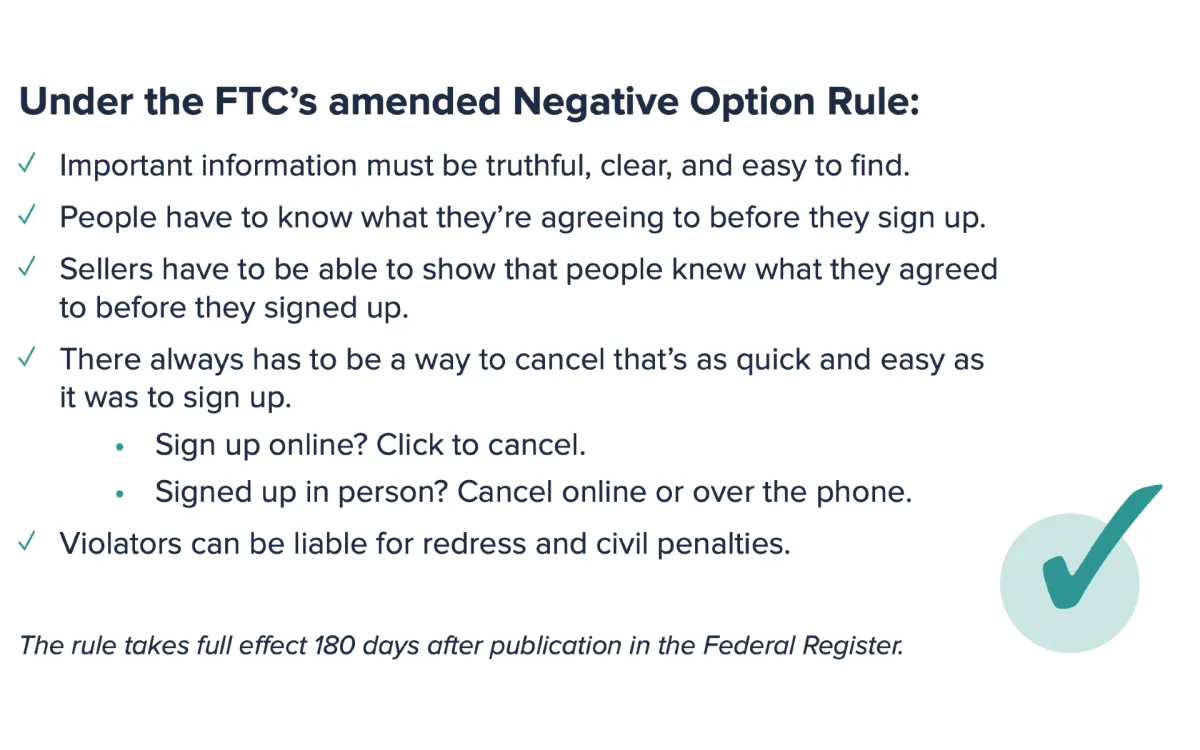
On October 16, 2024, the Federal Trade Commission (FTC) announced the finalization of its Click to Cancel rule, making it easier for consumers to end recurring subscriptions and memberships. The new rule, which will take full effect 180 days after publication in the Federal Register, addresses longstanding issues with negative option marketing practices that have trapped consumers in unwanted recurring payments.
Under the new rule, sellers must make canceling a subscription or membership as simple as signing up. For online subscriptions, this means providing a straightforward "click to cancel" option. The rule also requires clear disclosures of important terms before obtaining billing information and mandates that sellers obtain consumers' express informed consent before charging them.
"Too often, businesses make people jump through endless hoops just to cancel a subscription," said FTC Chair Lina M. Khan. "The FTC's rule will end these tricks and traps, saving Americans time and money."
Key provisions of the rule include:
- Prohibition on misrepresenting material facts related to negative option features
- Requirement to provide clear and conspicuous disclosures of important information
- Mandate to obtain express informed consent before charging consumers
- Provision of a simple cancellation mechanism that is at least as easy to use as the sign-up process
The FTC's action comes after receiving more than 16,000 comments from the public during the rulemaking process. The agency reports receiving nearly 70 consumer complaints per day on average in 2024 related to negative option and recurring subscription practices, up from 42 per day in 2021.
Consumer advocacy groups have welcomed the new rule. "This is a significant step forward in protecting consumers from deceptive subscription traps," said John Smith, director of a consumer rights organization. "For too long, companies have profited from making cancellation unnecessarily difficult."
The rule applies to all forms of negative option marketing, including automatic renewals, continuity plans, and free-to-pay conversions. It covers offers made in various media, including online, telephone, and in-person transactions.
Industry groups have expressed concerns about implementation costs and timelines. Jane Doe, spokesperson for a retail association, stated, "While we support consumer protection, we are concerned about the short implementation timeline and potential burdens on small businesses."
The FTC estimates the rule will save consumers between $6.1 billion and $49.3 billion over ten years. Implementation costs for businesses are estimated to range from $100.9 million to $826.2 million over the same period.
Enforcement of the rule will allow the FTC to seek civil penalties against first-time offenders, a power not previously available for all types of negative option marketing. This change is expected to provide a stronger deterrent against unfair practices.
Consumer education will play a crucial role in the rule's effectiveness. The FTC plans to launch awareness campaigns to inform the public about their rights under the new rule and how to exercise them.
As businesses prepare to comply with the new requirements, consumers can expect to see changes in how subscriptions are marketed and managed in the coming months. The FTC advises consumers to carefully review the terms of any subscription offers and to report any difficulties with cancellation to the agency.
Key Facts
- Rule finalized on October 16, 2024
- Takes full effect 180 days after Federal Register publication
- Applies to all forms of negative option marketing across various media
- Estimated consumer savings of $6.1-$49.3 billion over 10 years
- Implementation costs for businesses estimated at $100.9-$826.2 million over 10 years
- FTC receiving nearly 70 related consumer complaints per day in 2024

